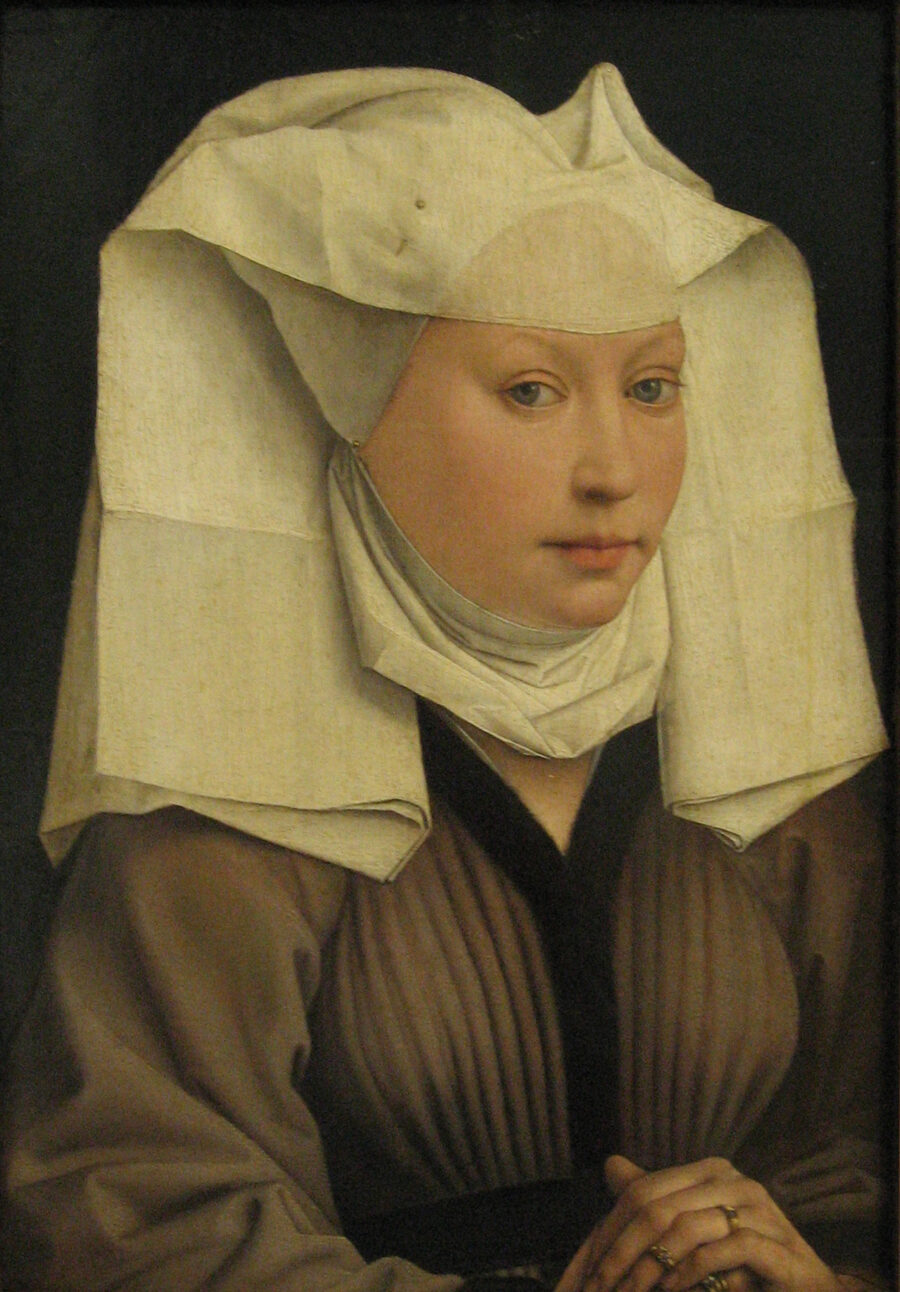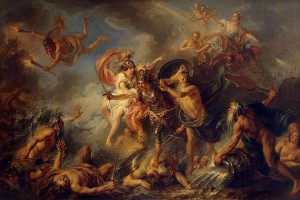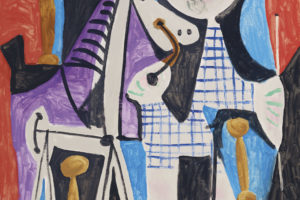The Showings: Lady Julian of Norwich
1342-1416
I
Julian, there are vast gaps we call black holes,
unable to picture what’s both dense and vacant:
and there’s the dizzying multiplication of all
language can name or fail to name, unutterable
swarming of molecules. All Pascal
imagined he could not stretch his mind to imagine
is known to exceed his dread.
And there’s the earth of our daily history,
its memories, its present filled with the grain
of one particular scrap of carpentered wood we happen
to be next to, its waking light one one especial leaf,
this word or that, a tune in this key not another,
beat of our hearts now, good or bad,
dying or being born, eroded, vanishing—
And you ask us to turn our gaze
inside out, and see
a little thing, the size of a hazelnut, and believe
it is our world? Ask us to see it lying
in God’s pierced palm? That it encompasses
every awareness our minds contain? All Time?
All limitless space given form in this
Medieval enigma?
Yes, this is indeed
what you ask, sharing
the mystery you were shown: all that is made:
a little thing, the size of a hazelnut, held safe
in God’s pierced palm.
by Denise Levertov, from The Stream & the Sapphire
Throughout Levertov’s poetry and reflections on poetic form, she expresses a sensitivity for the ‘rifts’ within the poems– abysses the reader is called to cross in a practice of “religious devotion to the truth.” The first poem of Levertov’s Lady Julian sequence demonstrates this very movement. By establishing a sense of distance between the speaker and Julian, Levertov invites us to recover a vision of the world as it exists in relation to the Incarnation thereby asking us to reverse our conceptions of the world predicated on our own experience so that we might behold the mystery of God’s great love for a little thing.
Levertov shapes a dynamic distance between the speaker and Julian by emphasizing the actual historical separation as well as assigning the speaker a defensive tone among the first introductory strophes. Listing the years in which Julian lived (1342-1416) within the title immediately notifies the reader of the intent to engage with a far away past. This historical gap is reiterated by the speaker in the fourth strophe when Julian’s mysterious vision is called a “medieval enigma.” As a result of the distance of centuries, the speaker emphasizes the distinction between Julian’s conceptions of the world and their own. And yet, Julian ‘asks’ the speaker as well as the reader to traverse across this gap in order to share in the mystery which was shown to her. With a tone of defensiveness, the speaker argues that the distance is not merely a matter of time. The speaker contends that each has been shaped by their times and that their difference in worldviews makes this separation of years more difficult to cross. From the very beginning of the poem, the reader is presented with the protests of the speaker to Julian. Addressing her by name, as though demanding her attention to consider an alternative point, the speaker begins listing reasons to demonstrate the arduousness of bridging this distance. The repetition of the conjunction “and” which begins the second and third strophe convey a succession and build up of the argument until the speaker reiterates the question to Julian in the beginning of the fourth strophe, “And you ask us to turn our gaze inside out… ?” With each subsequent “and” the gap between our world and Julian’s deepens and widens. Therefore, by the fourth strophe, the speaker arrives at the climax of their protest in which they fire a string of questions:
And you ask us to turn our gaze
inside out, and see
a little thing, the size of a hazelnut, and believe
it is our world? Ask us to see it lying
in God’s pierced palm? That it encompasses
every awareness our minds contain? All time?
All limitless space given form in this
medieval enigma?
The incessant questions dominating this strophe and the twice repeated request of Julian (“you ask”) expresses an attitude of surprise and incredulity on the part of the speaker notifying the reader that Julian’s demand is no small challenge.
Julian’s request, however, to share her vision and close the distance between her world and ours demands that we move– not Julian. Julian does not offer the option of meeting ‘halfway,’ but insists that we change our gaze. This sense of removal paired with the imperative to move back to share in Julian’s vision signifies a movement of recollection; we must traverse the distance of history outside moving past own context in order to recover something lost in the past.
The speaker’s protests throughout the beginning of the poem not only suggest the difficulty of Julian’s request, but also represents two perspectives which must be reoriented.
In the first and second strophe, the speaker paints a picture of a worldview occupied with the beyondness of the world– that which remains ‘nameless’ to us. Dominated by an awareness of the unknown, the speaker points to things we “ call black holes” and “the unutterable swarming of molecules” to underscore a lack of definable dimensions by which man’s science is unable to impose. The closing lines of the second strophe,
… All Pascal
imagined he could not stretch his mind to imagine
is known to exceed his dread
insinuates that this particular gaze clouds human existence with fear. Unable to define the universe, the unknown casts a threatening and foreboding shadow such that even Pascal admitted great dread toward the things which surpassed his imaginative capacities.
In the third strophe, the speaker offers another gaze which likewise obstructs our ability to adopt Julian’s vision. Rather than a expansive view, this perspective is overwhelmed with the each moment packed with all of its passing particularities. Driven by the “daily history,” the speaker calls Julian’s attention to the plenitudinous present:
… filled with grain
of one particular scrap of carpentered wood we happen
to be next to, its waking light on one especial leaf,
this word or that, a tune in this key not another.
The emphasis upon the singularity of each by chance or choice suggests that this gaze demands full and unbroken attention to catch the multitudinous treasures of the present. While this gaze demands perhaps a very positive practice of wakeful presentness, the speaker once again implies a dissatisfaction with this vision of the world. Before cutting off their argument, the speaker describes these moments, “dying or being born, eroded, vanishing—.” The limitations and laws of time draw all the present particularities into a past in which the “scrap of carpentered wood” and “especial leaf” vanish altogether. Thus, while the first vision describes the human experience as one filled with dread by the undefined and unnameable dimensions of space, this latter vision characterizes a life frustrated by the fleeting present, burdened by the pressure of time’s limits. Both views, however, are determined by human standards according to our capacities and experiences.
To turn our gaze inside out is to invert both these perspectives and see the world as Julian asks us to see it as, “a little thing, the size of a hazelnut.” Rather than the unlimited world of the first two strophes, Julian invites us to believe the world as “little” such that “all limitless space” is contained within this ‘little thing.’ Similarly, the multitude of moments with particularities aplenty are rounded into one whole such that this singular thing contains “every awareness our minds contain” and “All time.” Seeing the world as “a little thing” requires us to perceive the world in relation to God. As the repeated parallels in the fourth and fifth strophes indicate, this perspective of the world as “a little thing, the size of a hazelnut” exists according to its place “in God’s pierced palm.” Levertov encourages us to recover a gaze determined by the divine existence, a view which totally reverses the perspectives the speaker described in the first three strophes. Reclaiming this vision propels us toward accepting new conclusions about the world and our human existence.
Julian, in asking us to ‘turn our gaze inside out’ and believe the world to be merely ‘a small thing’ gives us a vision according to the divine perspective through which she shares the mystery of God’s love. The image of “God’s pierced palm” twice repeated calls forth the presence of the Incarnation, Jesus Christ, and specifically his crucifixion. The scarred hands of God representative of the divine presence in the poem, bear witness to the great and loving sacrifice of Jesus. That God would die for such ‘a little thing’ declares the incomprehensibly deep love of God. Furthermore, Levertov characterizes God’s love for the small and vulnerable world by drawing attention to the helpless nature of the world in contrast to God’s active care. In both repetitions, Levertov employs enjambment so that the last words of the lines emphasize the verb. While the world is first described as “lying in God’s pierced palm,” the second repetition portrays the world “held safe in God’s pierced palm”– receiving the loving activity of God. The word “lying” indicates passivity and even suggests the frailty of the world. Perhaps such ‘a little thing’ would cease to exists if God did not hold it safely. By evoking the crucifixion of Jesus Christ, an icon representing God’s unimaginable love for his creation, as well as underscoring creation’s continual dependence upon the active love of God, Levertov assists us in beholding the mystery which was shown to Julian: that God loves and keeps ‘a little thing.’
We, the speaker and the reader, are called to share and, in fact, recover an awareness of the mystery of God’s love according to Julian. To do so, however, Julian ‘asks’ that we make passage across a great distance of years and differences to see the world as it was shown to her: the world as it exists in relation to God Himself, the Creator, Savior, and Sustainer of the world. Denying worldviews determined by our human experiences of space and time, we are drawn forward into a worldview in which the defining premise of our existence is according to the God’s immeasurable love.





Leave a Reply
Your email is safe with us.